Supermarkets chains in China: Aldi & Costco’s success

Supermarkets in China are becoming more and more prevalent. Most of these chains have shares held by foreign investments and only a few of them are fully domestic. China’s grocery retail market was forecast to grow by 32.6% by 2022. However, grocery retailers in China have been facing hard situations. There are a lot of supermarkets in China such as Wal-Mart, Metro, Carrefour, Trust-mart, Tesco, and others. Despite these hard situations, succeeding as a supermarket in China is still possible, Aldi and Costco are living proof of this. This article explores the reason for Aldi and Costco’s success in the Chinese market.
Does the supermarket model still work in China?
In 2019, with the sudden increase in online retail, many supermarkets faced unexpected challenges, seeing sales on the market decrease. The preferences of Chinese consumers are changing and supermarkets should embrace these new trends.
Cost-Effective Agency
KPI and Results focused. We are the most visible Marketing Agency for China. Not because of huge spending but because of our SMART Strategies. Let us help you with: E-Commerce, Search Engine Optimization, Advertising, Weibo, WeChat, WeChat Store & PR.
Online and offline supermarkets integrations
A new era is evolving for the supermarket industry in china. An approach that integrates both online and offline experiences and relies heavily on digitalization and consumer data. For example, the Hema (Supermarket opened by Alibaba) app converges online and offline retail experience altogether to provide an omnichannel experience for its customers.
Chinese consumers can easily scan bar codes via the App to find out product information, process payments, or get products delivered to home within 30 minutes.
Establishing partnerships with China’s internet giants such as Alibaba, Tencent and JD.com will allow retailers access to different tools and functions attractive to Chinese consumers.
In any case, attention must always be paid to sudden changes in the Chinese market, supermarkets must further improve customer technology and experience in order to keep up with the sector.
Digital technology in supermarkets
In order to respond to the rapid digital growth, many brands have established future plans to improve current technologies in-store by becoming more AI-oriented. Technologies like:
- check-out machines incorporate facial recognition payment function
- high-tech ‘unmanned’ stores
How Aldi and Costco entered the Chinese market?
Although Carrefour’s failures, which sold its 80% stake in its China operations to local retailer Suning, had thrown a cloud over the future of supermarkets in China, in 2019 the foreign supermarket chains Aldi and Costco entered the Chinese market.
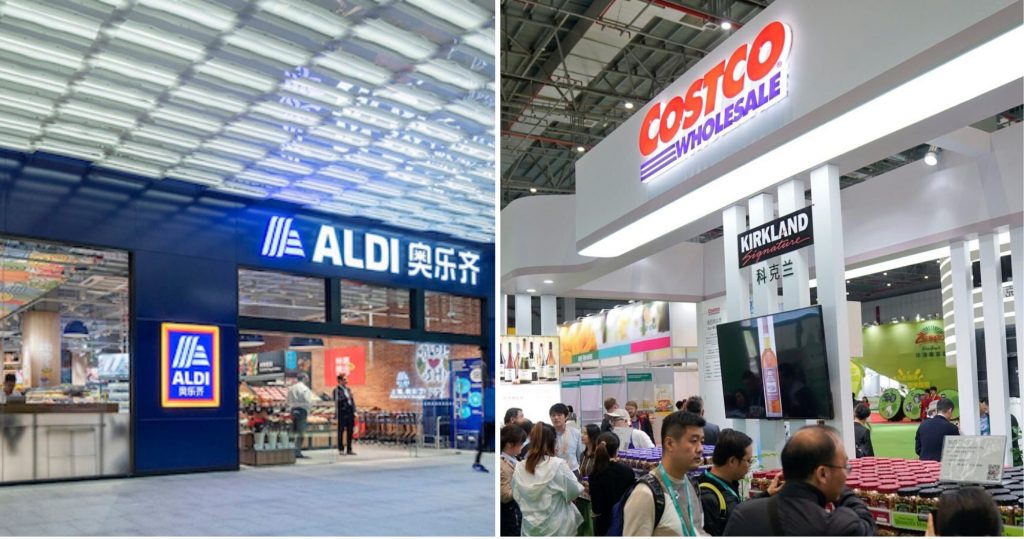
In 2019, the German supermarket chain Aldi and the US supermarket chain Costco both opened their first physical stores in Shanghai. Thousands of Chinese people lined up outside and waited for the shops to open for the first time, since their opening, have attracted huge crowds of shoppers, but why?
Chinese consumers are curious about the new food retail formats and new sales strategies and these two supermarkets keep the interest of consumers alive. For example, a big factor that has attributed Costco’s success so far is that it offered luxury products such as Hermes bags at a reasonable price at the store’s debut.
How Aldi and Costco are developing their marketing strategies to reach Chinese consumers?
Using Chinese digital platforms to promote and sell their products is their major marketing strategy. For example, both Aldi and Costco have localized their strategies for the Chinese market:
- creating a mandarin website, hosted in China,
- selling on Chinese e-commerce platforms like Tmall,
- promoting their products on Chinese social media like Wechat, Weibo and Xiaohongshu.
Aldi marketing strategy to enter the Chinese market
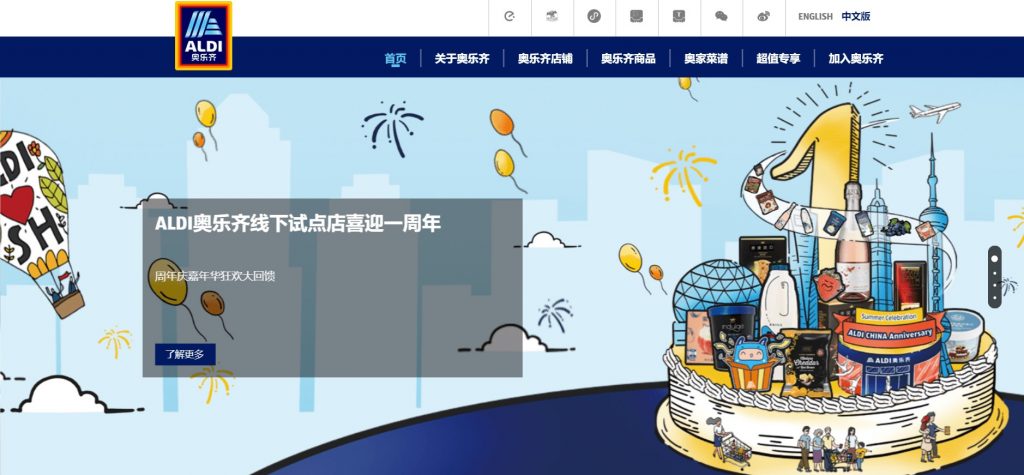
Aldi stores are customized and tailored specifically for the China market. In fact, the stores offer an integrated online to offline retail experience and include a scan and go function on WeChat that lets customers skip the queue.
Opening of Tmall global store with the aim of to test the Chinese market
Aldi has tested the needs of the Chinese, and in general, the Chinese market by launching a flagship store on Tmall Global. On Tmall, Aldi sells cheap, high-quality private-label items such as dried apricots, Knoppers chocolate wafers, and so on, giving customers the option of purchasing imported cross-border e-commerce items that may be more difficult to find in China.
Tmall Global is the Tmall cross-border e-commerce platform that offers brands the opportunity to:
- sell their products without having a physical presence in China
- skipping over lengthy product registration and approval processes.
Aldi’s Tmall global store gave it a channel to test new products and customers’ reaction to them, without incurring long paperwork to export them and avoiding inventory risks.
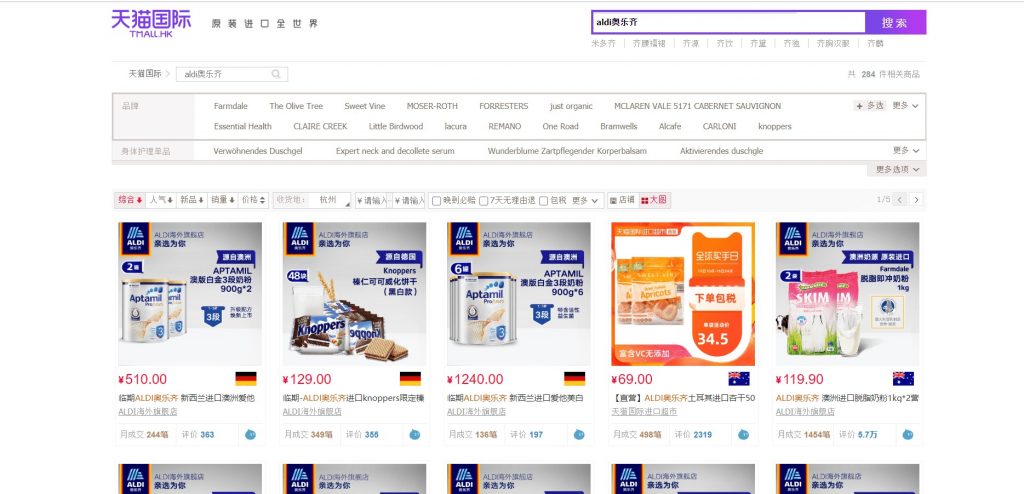
Chinese Consumers can also order ALDI products through delivery platforms Ele.me and JD Diaojia.
Smarter and smaller stores customized to Chinese consumers needs
Aldi stores format has been customized and tailored specifically for the China market to better understand and interact with Chinese consumers. Offline stores give consumers the chance to discover and try new products like fresh groceries.
However, since Chinese consumers prefer small shops, with technologies functions, Aldi opted for smaller and smarter retail stores that are equipped with WeChat technology and offer speedy delivery options.
These functions, satisfy completely the new trend in the supermarkets industry of digital technology and offline and online integration.
Given the demand for these products among Chinese consumers, the stores place an emphasis on fresh products and ready-made dishes. In addition, key products (i.e. loved by the Chinese), such as snacks, imported goods, and cosmetics, are placed at the entrance of each lane together with messaging to attract and guide buyers.
Aldi’s stores are also in more convenient locations and offer a lot of low-priced items, but still focused on private-label goods. Aldi can sell its products at prices that are 15-20% lower than those of typical supermarkets.
Using Wechat to promote and sell products and educate consumers
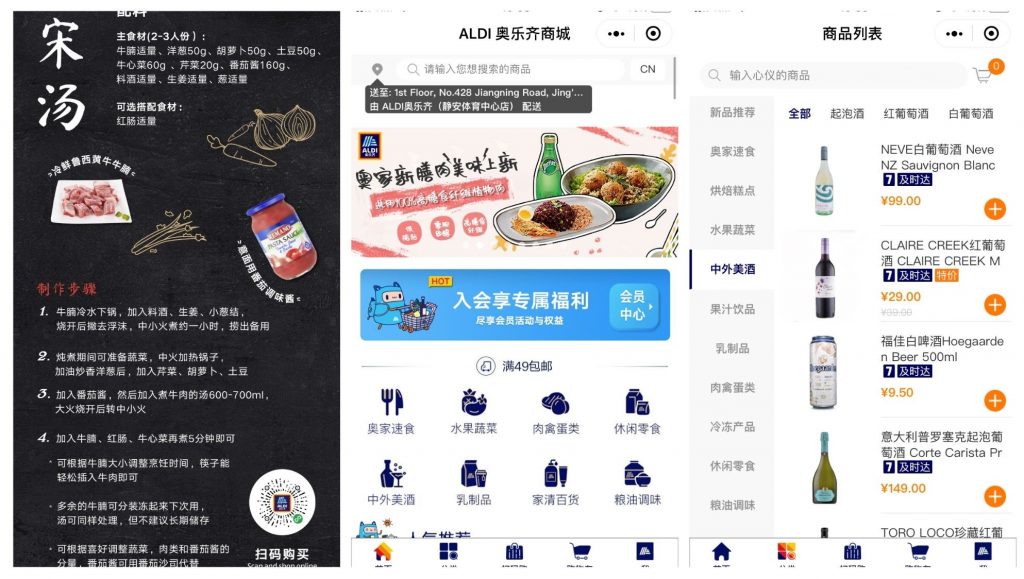
Aldi’s scan-and-go WeChat mini-program and convenient delivery services indicate its commitment to creating a localized Chinese shopping experience.
Through mini-programs, Chinese consumers can scan the barcodes of the items and buy the products with WeChat Pay or Alipay.
In addition, the Aldi WeChat mini-program offers services such as:
- delivery within 3 km within an hour
- free delivery for those who spend 99 RMB per order
- delivery from other cities around Shanghai within one day.
The convenient delivery service gives consumers the option of ordering food from home when products are heavy and people don’t want to go out. It works a lot in China where online platforms are the best way to buy products, in particular for the young generation.
2020 New Aldi store format in China
Thanks to its amazing success in the Chinese market, in April 2020, Aldi Introduces a new store format which is the latest location designed to meet the needs of more Chinese consumers.
- The store celebrated its launch with special promotions, brings more convenience to ALDI’s customers,
- Customers can find their favorite French wine and Australian ice cream quickly, and pay for them easily using ALDI CHINA’s WeChat mini-program’s Scan & Go function,
- To help ALDI serve its customers better, the new store will have a WeChat group to inform customers about deals and offer benefits to consumers who sign up as ALDI CHINA members.
Costco marketing strategy to enter the Chinese market
Tmall to taste Chinese consumers shopping habits
Like Aldi, Costco entered China with a digital presence by selling on Tmall Global, and in September 2017, Costco opened a storefront on the Tmall platform, the most used B2C platform for local retail operations.
On Tmall, Costco has expanded its current assortment of food, health, beauty, and clothing, expanding to new categories including consumer electronics and wine.
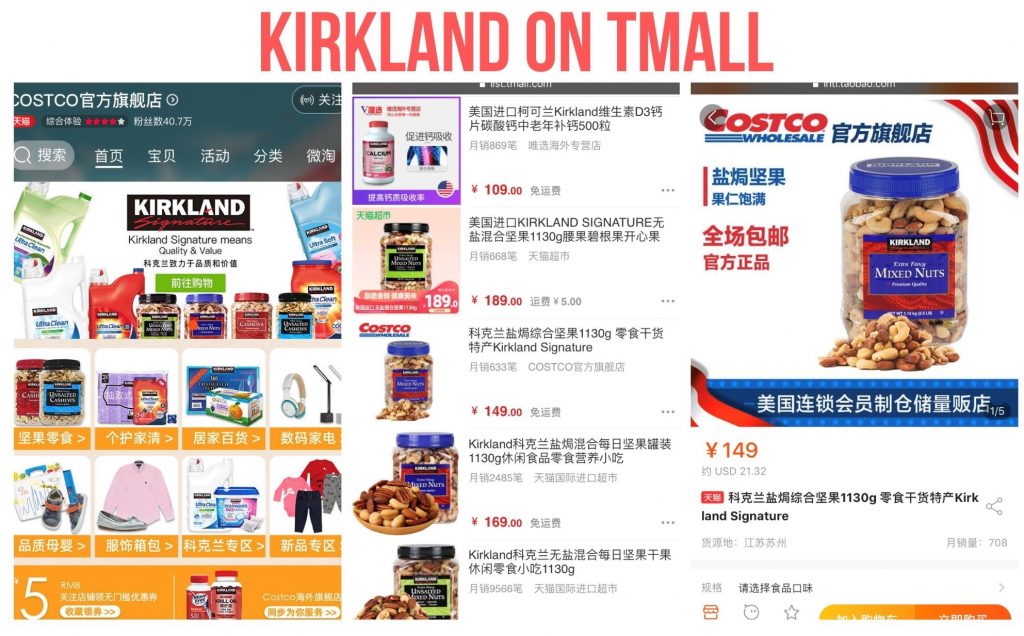
The opening of the storefront on Tmall, helps Costco build a reputation among Chinese consumers, and at the same time, it gains information on Chinese consumers’ shopping habits.
Even if, Chinese consumers prefer branded goods, consumers in Shanghai are open-minded and used to foreign products and new models. That’s why Costco found success on the B2C platform with its assortment of American goods and the strength of its private-label Kirkland signature brand.
Discount for the Costco annual membership
When entering a market for the first time, the goal is to create momentum and quickly. Sweetening the deal with a lower price is a shortcut to getting started. This is what Costco did by entering the Chinese market.
Costco in China started recruiting members with a regular annual membership fee of 299 RMB (42 USD) a third cheaper than in the U.S. About a month before the inauguration, Costco announced a 100 RMB discount for customers who registered by a specific date.
Even if the 299 RMB annual membership fee sounds a bit too much for Chinese people, the discounted prices and the availability to use the Costco card around the world attracted their attention.
Chinese social media helped Costco to create branding
In addition, thanks to social media the Chinese have the opportunity to follow KOL (Key Opinion Leaders), whom they trust very much for product recommendations, all over the world, even in the US. This made Costco easily recognizable among Chinese consumers who, thanks to social media, already knew the popularity of this supermarket chain outside of China.
Although Chinese consumers have many options both online and offline to buy products, Costco in China has become not just a grocery shopping, but a leisure activity for families, spending hours in its stores.
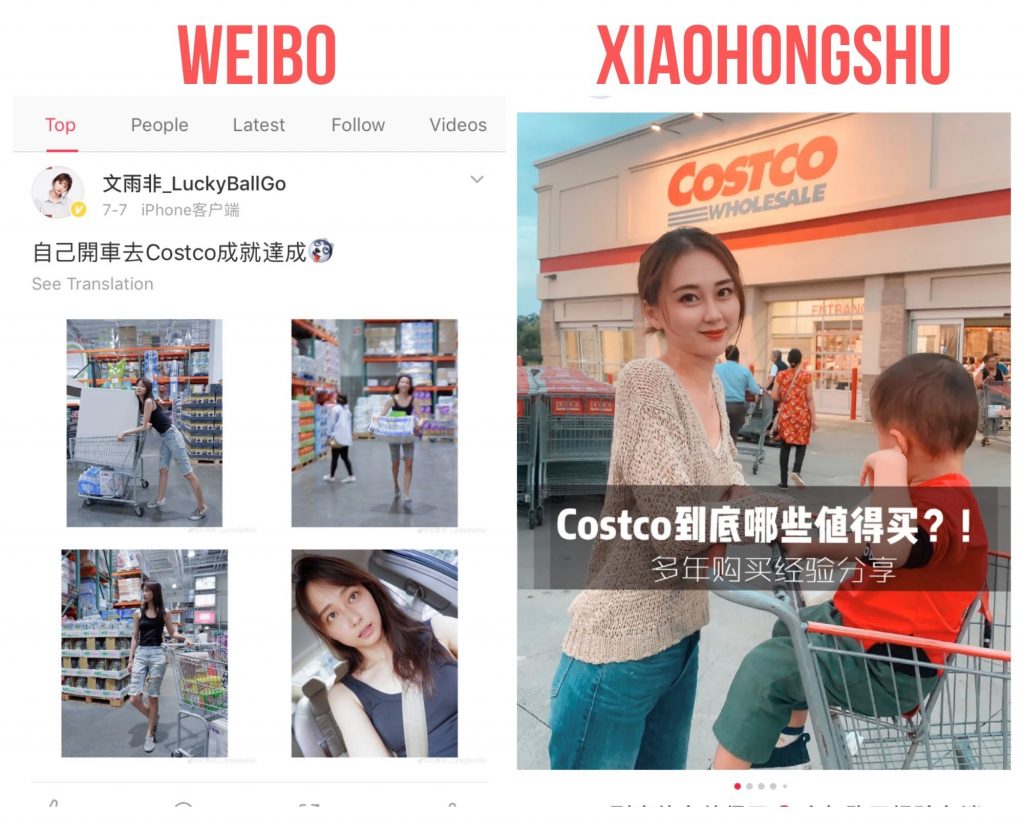
Costco brought a sort of newness in the supermarket industry in China, in China, just being the third or fourth store with items on the shelf is not enough anymore, and Costco gave reasons for consumers to pick him over other options.
Costco was ahead of time, it got to learn about the Chinese consumer through its e-commerce website, and the Chinese consumer knew about the brand from their other Asia operations. In addition, the demand is huge as there’s a growing middle class in China that is interested in Western goods and items.
In Feb 2020 Costco confirmed a plan to open a second store in Shanghai, as with growing purchasing power, Chinese customers have adopted a more open and mature mindset toward consumption.
How will be the future of these supermarkets chains in China?
Although China remains a viable potential market for the growth of overseas supermarket brands, there is a huge challenge for these brands to truly conquer the Chinese market by facing rapid growth in online retail sales and intense local competition.
Despite their success after the first year of opening, how will their future look in the constantly changing Chinese market? Time will tell us.
For now, the fact remains that their particular marketing strategy with the help of Chinese digital channels has certainly been successful in the Chinese market.
GMA is your best choice to enter the Chinese market
GMA (Gentlemen Marketing Agency) is a Digital Marketing Agency that is an expert in helping foreign companies to establish or strengthen their position in China.
We are constantly looking for new ideas in order to renew our solutions packages and always be on top of the market trends. Our motto? We are 100% digital and we run our customer’s marketing campaigns the same way we do with our own campaigns: Efficient and results-driven.
If you want to expand your business in China, Contact us, we will find together the best strategy for your company!

Do you want to know more about How to use Chinese channels to boost sales? Contact GMA a digital marketing agency, specialized in the Chinese digital market.
Read also:







Really good article, how to reach Chinese supermarket when we are a small brand? what is the cost ?